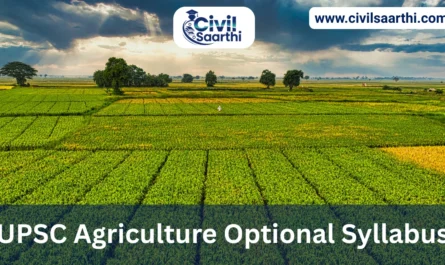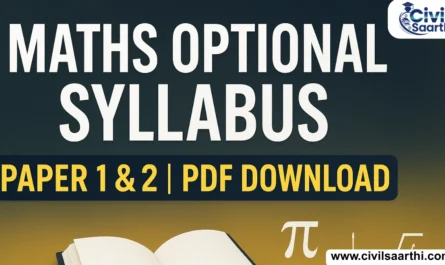The UPSC Sociology Syllabus 2025 is a key element for aspirants choosing Sociology as their optional subject in the Civil Services Examination. It includes two papers: Paper I and Paper II which assess both theoretical and applied understanding of sociological concepts. Understanding the detailed syllabus helps in planning and streamlining the preparation strategy.
UPSC Sociology Syllabus
UPSC Sociology Syllabus provides candidates with a clear overview of the subject, divided into two papers. Paper I covers the fundamentals of sociology and key theoretical concepts, while Paper II focuses on Indian society, examining its structure and contemporary issues. This high-level breakdown allows aspirants to identify their strengths and address any knowledge gaps strategically.
UPSC Sociology Optional Syllabus
UPSC Sociology Optional Syllabus offers a comprehensive framework for understanding the intricacies of human society, including its structures, dynamics, and transformations. Sociology as an optional subject provides an analytical lens to examine contemporary social issues, which proves valuable not only for the optional papers but also enhances performance in General Studies and the essay components of the UPSC examination.
UPSC Sociology Syllabus Overview
The overview helps aspirants quickly understand the structure and focus areas of the UPSC Sociology Syllabus. It also helps in aligning your resources and reading materials with the UPSC 2025 Pattern.
| UPSC Sociology Syllabus Overview | ||
| Paper | Main Focus | Content Type |
| Paper I | Fundamentals of Sociology | Sociological thinkers, theory, methods |
| Paper II | Indian Society and its structure and dynamics | Application of theory to Indian issues |
UPSC Sociology Optional Syllabus PDF
The UPSC Sociology Optional syllabus is divided into two papers – Paper I (Foundations of Sociology) and Paper II (Indian Society: Structure and Change). Paper I covers classical sociological thinkers, research methods, and sociological theories, while Paper II focuses on Indian social structure, institutions, social change, development, and issues like caste, class, gender, and globalization. The PDF link has been shared below.
UPSC Sociology Optional Syllabus PDF Click here to download
UPSC Sociology Optional Syllabus for Paper 1
UPSC Sociology Optional Syllabus for Paper 1 focuses on the fundamentals of sociological thought and theory. It covers key concepts, thinkers, and the development of sociology as a discipline, providing a strong foundation for analyzing social structures and processes. This paper helps aspirants build a clear understanding of core principles that are essential for both academic insight and practical application in the civil services examination.
FUNDAMENTALS OF SOCIOLOGY
- Sociology – The Discipline:
(a) Modernity and social changes in Europe and emergence of Sociology.
(b) Scope of the subject and comparison with other social sciences.
(c) Sociology and common sense. - Sociology as Science:
(a) Science, scientific method, and critique.
(b) Major theoretical strands of research methodology.
(c) Positivism and its critique.
(d) Fact value and objectivity.
(e) Non-positivist methodologies. - Research Methods and Analysis:
(a) Qualitative and quantitative methods.
(b) Techniques of data collection.
(c) Variables, sampling, hypothesis, reliability, and validity. - Sociological Thinkers:
(a) Karl Marx – Historical materialism, mode of production, alienation, class struggle.
(b) Emile Durkhteim – Division of labour, social fact, suicide, religion and society.
(c) Max Weber – Social action, ideal types, authority, bureaucracy, protestant ethic and the spirit of capitalism.
(d) Talcolt Parsons – Social system, pattern variables.
(e) Robert K. Merton – Latent and manifest functions, conformity and deviance, reference groups.
(f) Mead – Self and identity. - Stratification and Mobility:
(a) Concepts – equality, inequality, hierarchy, exclusion, poverty, and deprivation.
(b) Theories of social stratification – Structural functionalist theory, Marxist theory, Weberian theory.
(c) Dimensions – Social stratification of class, status groups, gender, ethnicity and race.
(d) Social mobility – open and closed systems, types of mobility, sources and causes of mobility. - Works and Economic Life:
(a) Social organization of work in different types of society – slave society, feudal society, industrial capitalist society.
(b) Formal and informal organization of work.
(c) Labour and society. - Politics and Society:
(a) Sociological theories of power.
(b) Power elite, bureaucracy, pressure groups and political parties.
(c) Nation, state, citizenship, democracy, civil society, ideology.
(d) Protest, agitation, social movements, collective action, revolution. - Religion and Society:
(a) Sociological theories of religion.
(b) Types of religious practices: animism, monism, pluralism, sects, cults.
(c) Religion in modern society: religion and science, secularization, religious revivalism, fundamentalism. - Systems of Kinship:
(a) Family, household, marriage.
(b) Types and forms of family.
(c) Lineage and descent.
(d) Patriarchy and sexual division of labour.
(e) Contem porary trends. - Social Change in Modern Society:
(a) Sociological theories of social change.
(b) Development and dependency.
(c) Agents of social change.
(d) Education and social change.
(e) Science, technology, and social change.
UPSC Sociology Optional Syllabus for Paper 2
UPSC Sociology Syllabus for Paper 2 focuses on Indian society, its structure, and the various processes of change and development it undergoes.
INDIAN SOCIETY: STRUCTURE AND CHANGE
A. Introducing Indian Society:
- Perspectives on the Study of Indian Society:
(a) Indology (G.S. Ghure).
(b) Structural functionalism (M. N. Srinivas).
(c) Marxist sociology (A. R. Desai). - Impact of colonial rule on Indian society:
(a) Social background of Indian nationalism.
(b) Modernization of Indian tradition.
(c) Protests and movements during the colonial period.
(d) Social reforms.
B. Social Structure:
- Rural and Agrarian Social Structure:
(a) The idea of Indian village and village studies
(b) Agrarian social structure- evolution of land tenure system, land reforms. - Caste System:
(a) Perspectives on the study of caste systems: G. S. Ghurye, M. N. Srinivas, Louis Dumont, Andre Beteille.
(b) Features of caste system.
(c) Untouchability-forms and perspectives - Tribal Communities in India:
(a) Definitional problems.
(b) Geographical spread.
(c) Colonial policies and tribes.
(d) Issues of integration and autonomy. - Social Classes in India:
(a) Agrarian class structure.
(b) Industrial class structure.
(c) Middle classes in India. - Systems of Kinship in India:
(a) Lineage and descent in India.
(b) Types of kinship systems.
(c) Family and marriage in India.
(d) Household dimensions of the family.
(e) Patriarchy, entitlements, and sexual division of labour. - Religion and Society:
(a) Religious communities in India.
(b) Problems of religious minorities.
C. Social Changes in India:
- Visions of Social Change in India:
(a) Idea of development planning and mixed economy.
(b) Constitution, law, and social change.
(c) Education and social change. - Rural and Agrarian Transformation in India:
(a) Programmes of rural development, Community Development Programme, cooperatives, poverty alleviation schemes.
(b) Green revolution and social change.
(c) Changing modes of production in Indian agriculture.
(d) Problems of rural labour, bondage, migration. - Industrialization and Urbanisation in India:
(a) Evolution of modern industry in India.
(b) Growth of urban settlements in India.
(c) Working class: structure, growth, class mobilization.
(d) Informal sector, child labour.
(e) Slums and deprivation in urban areas. - Politics and Society:
(a) Nation, democracy and citizenship.
(b) Political parties, pressure groups, social and political elite.
(c) Regionalism and decentralization of power.
(d) Secularization. - Social Movements in Modern India:
(a) Peasants and farmers’ movements.
(b) Women’s movement.
(c) Backward classes & Dalit movements.
(d) Environmental movements.
(e) Ethnicity and Identity movements. - Population Dynamics:
Population size, growth, composition and distribution.
Components of population growth: birth, death, migration.
Population Policy and family planning.
Emerging issues: ageing, sex ratios, child and infant mortality, reproductive health. - Challenges of Social Transformation:
(a) Crisis of development: displacement, environmental problems and sustainability.
(b) Poverty, deprivation and inequalities.
(c) Violence against women.
(d) Caste conflicts.
(e) Ethnic conflicts, communalism, religious revivalism.
(f) Illiteracy and disparities in education.
Also Read: UPSC Mains Syllabus
Best Books for UPSC Sociology Syllabus 2025
Books should be selected based on clarity, authenticity, and coverage. Candidates are advised to combine these with IGNOU BA/MA materials or coaching notes if needed.
| Recommended Books for UPSC Sociology Syllabus | ||
| Paper | Title | Author/Source |
| Paper I | Sociology: Themes and Perspectives | Haralambos & Holborn |
| Sociological Theory | George Ritzer | |
| Introduction to Sociology | Anthony Giddens | |
| BA Sociology Notes | IGNOU | |
| Paper II | Indian Society | Ram Ahuja |
| Social Change in Modern India | M.N. Srinivas | |
| Caste: Its Twentieth Century Avatar | M.N. Srinivas | |
| MA Sociology Notes | IGNOU | |
Preparation Tips for UPSC Sociology Syllabus
- Master the Syllabus
- Break down Paper 1 (basic concepts, theories) and Paper 2 (Indian society) into subtopics for targeted study.
- Use Standard Sources
- Paper 1: Haralambos, Ritzer, Giddens
- Paper 2: IGNOU notes, Indian Sociologists (Yogendra Singh, M.N. Srinivas)
- Make Crisp Note
- Note key concepts, thinkers, and examples in bullet points with flowcharts for quick revision.
- Link with Current Affairs
- Use recent news and reports to enrich answers in Paper 2 (e.g., caste, gender, migration).
- Practice Answer Writing
- Follow a clear structure (Intro–Body–Conclusion) and write regularly using PYQs.
- Quote Thinkers Smartly
- Apply relevant sociologists/theories contextually rather than force-fitting them.
- Revise Strategically
- Revise regularly and focus on weak areas; make short revision notes for quick look-ups.
- Join Test Series or Peer Discussions
- Helps with feedback, perspective-building, and improving answer quality.
FAQs on UPSC Sociology Syllabus
What is the total number of papers for sociology in UPSC Mains 2025?
There are two papers: Paper I (Fundamentals of Sociology) and Paper II (Indian Society).
Is sociology a good optional for UPSC 2026?
Yes, sociology is popular due to its conceptual clarity, ease of understanding, and relevance to GS papers.
Can non-sociology graduates take sociology optional in UPSC?
Yes, any graduate from any stream can choose sociology as an optional subject.
Are current affairs important for Paper II of sociology?
Absolutely. Contemporary social issues must be linked with sociological theories in answers.
What are the best books to cover for UPSC Sociology Syllabus 2026?
Books by Haralambos, Giddens, IGNOU materials and Indian authors like Nitin Sangwan are also recommended.







